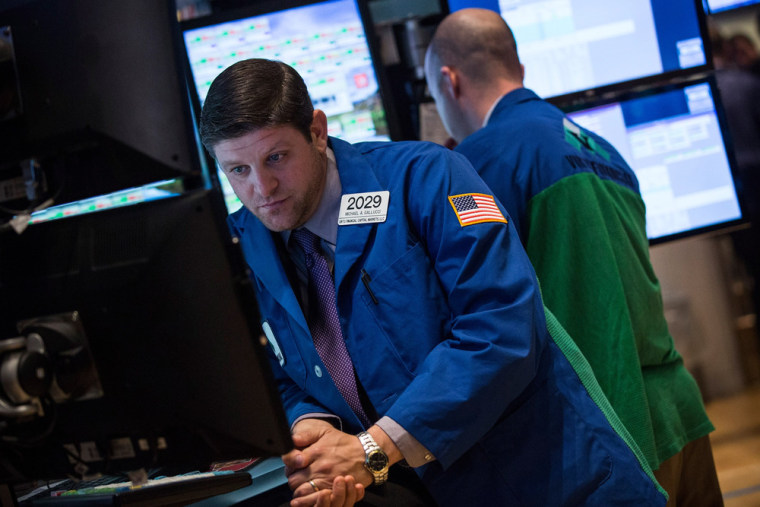Stocks posted small losses on Tuesday, with the S&P 500 recording its first two-day decline of the month, as investors weighed upbeat earnings from Home Depot and a cautionary note from Best Buy while waiting for signs of central-bank monetary moves ahead.
A day after clearing 16,000 for the first time and recording its fourth consecutive record-high close, the Dow Jones Industrial Average wavered on either side of neutral before finishing nearly 9 points in the red.
The S&P 500 also slid 3 points, with utilities pacing losses and energy the best performing of its 10 major industry groups. On Monday the benchmark climbed to an intraday record and surpassed the 1,800 level before finishing the session with a modest loss.
After halting a a six-session winning streak on Monday, the Nasdaq extended those losses into a second session, dropping 17 points.
The CBOE Volatility Index (VIX), a gauge of uncertainty in the market, rose to 13.46
"I think the market is consolidating recent gains, and quite frankly, we would like to see the market take a pause here after the recent strong run up," Jim Russell, senior equity strategist for US Bank Wealth Management, said of gains that have the S&P 500 up 25 percent this year. "One of the things that worries us the most is sentiment; there seems to be no fear, and there's a lack of appreciation that markets are volatile."
Federal Reserve Chairman Ben Bernanke speaks at a dinner Tuesday night, and Wednesday brings the release of minutes from the last Federal Open Market Committee meeting. Fed officials "could signal the attitude of commencement of the taper program either later this year or early 2014," said Russell.
The yield on the 10-year Treasury note used in figuring mortgages and other consumer loans climbed 4 basis points to 2.71 percent. The dollar fell against the currencies of major U.S. trading partners.
Oil futures for December delivery rose 31 cents, or 0.3 percent, to $93.34 a barrel; gold prices rose $1.20, or 0.1 percent, to $1,273.50 an ounce.
Home Depot, the world's largest home-improvement retailer, beat profit and sales expectations for the third quarter and hiked its fiscal-year forecast, with its shares hitting all-time highs.
The retailer's results point to "further consumer strength, and once again is suggesting the consumer is better positioned and taking advantage of the recovery, employment, house prices and the de-leveraging of the balance sheet, and that things are looking good," said Wilkinson.
Best Buy cautioned its strategy of keeping pace with discounts offered by rivals during the holiday season would dent fourth-quarter profits, with shares of the consumer-electronics retailer hit.
"Clearly Home Depot is benefiting from interest rates that are low housing that is strong, while Best Buy is suffering from severe price discounts. I wouldn't be surprised to see Amazon win that battle," said Russell.
The FOMC statement at the end of October was remarkably optimistic; it would not surprise me if what we learned from the minutes is if they say, 'let's commence the tapering in December if there is limited impact of a government shutdown.' So there might be a surprise tomorrow," said Andrew Wilkinson, chief economic strategist at Miller Tabak & Co.
"The market is having a bit of a rethink of the impact over tapering; you don't need the Fed buying $85 billion a month, if it's $80 billion or $75 billion three or four months from now, it's a tiny pin prick," said Wilkinson, referring to the central bank's asset purchases.
Russell had a differing view, citing the 7.3 percent unemployment rate and sufficiently weak statistics on inflation as reasons the Fed "can't take the foot off the accelerator."
We would look for the possibility of the Fed pushing tapering into 2014 at the very least, and perhaps even carry it further, which of course is good news for stocks, as the party continues," he added.
Data out during Tuesday's session included third-quarter employment costs, which rose marginally in the third quarter, pointing to tame wage inflation that should let the Fed maintain its bond-buying program.
